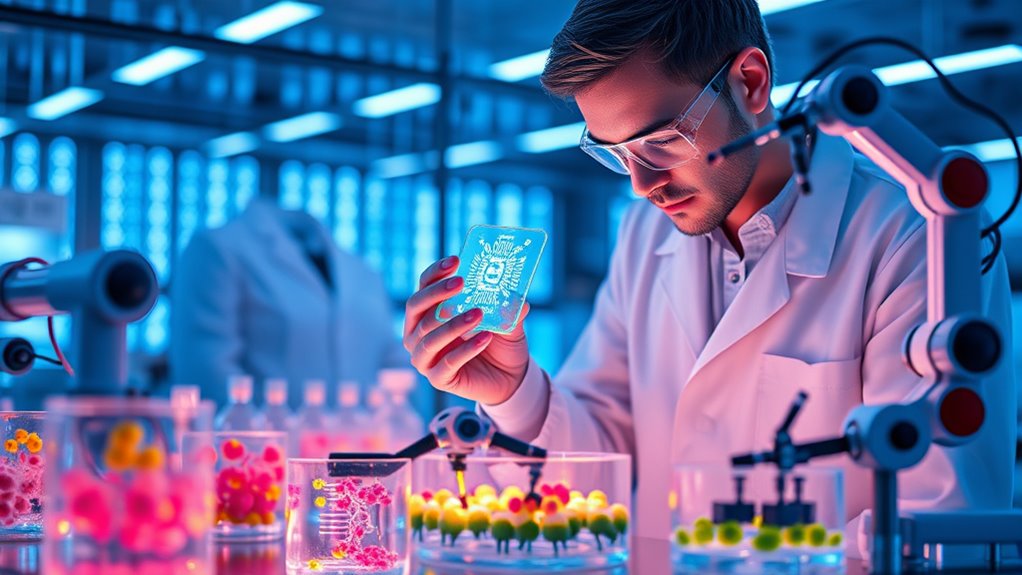AI is revolutionizing synthetic biology by enabling precise gene editing, optimizing enzymes for specific functions, and accelerating data analysis to uncover biological insights faster. It supports personalized medicine, improves biomanufacturing processes, and helps develop sustainable products like biofuels and lab-grown meat. With ongoing advancements, AI guarantees safer and more ethical innovations while opening new opportunities for health, industry, and environmental solutions. Keep exploring how AI is shaping the future of this transformative field.
Key Takeaways
- AI automates gene editing and personalizes treatments through precise analysis of vast human DNA datasets.
- It designs and predicts protein structures, enabling novel enzyme development and ethical, animal-free protein production.
- AI integrates diverse biological data to uncover complex system insights, accelerating research and discovery.
- It optimizes biomanufacturing processes, leading to sustainable production of biofuels, lab-grown meat, and materials.
- Responsible AI development addresses safety, security, and ethical concerns, ensuring innovations align with societal standards.

Artificial intelligence is revolutionizing synthetic biology by accelerating gene editing, enzyme design, and biomanufacturing. You’re now able to harness AI models like CRISPR-GPT to automate complex gene editing experiments, making it faster and more accurate to develop treatments for diseases and even reverse aging processes. These AI tools analyze vast datasets, including over three billion base pairs of DNA in human genomes, to identify precise editing targets. This means you can customize gene expression for individual patients, opening the door to highly personalized medicine. Furthermore, virtual testing of gene edits allows you to evaluate potential outcomes rapidly and at a fraction of the cost compared to traditional lab experiments. This not only speeds up innovation but also minimizes risks associated with errors or unintended consequences. Despite these advancements, ongoing AI Security concerns highlight the importance of developing safety measures to prevent misuse and ensure responsible innovation.
In enzyme design and protein expression, AI plays a pivotal role in optimizing enzymes for specific functions, improving their efficiency and specificity. You can now design enzymes tailored for industrial applications, such as biofuel production or pharmaceutical manufacturing, with greater confidence. AI also supports animal-free protein expression systems, addressing ethical concerns and enhancing production efficiency. By predicting protein structures and functions, AI enables you to engineer novel proteins that were previously impossible to create. Additionally, the integration of biological data enhances the accuracy of these predictions, enabling more precise engineering. This integration of diverse datasets accelerates research, leading to faster discovery of new biological insights. Furthermore, AI-assisted synthetic pathway design improves the production of valuable chemicals and biofuels by streamlining complex metabolic processes. These advancements help you develop sustainable solutions that reduce reliance on petrochemicals and move towards more environmentally friendly manufacturing.
Data integration and analysis are essential for these breakthroughs. You need high-quality, curated datasets, including experimental conditions and outcomes, to feed AI models. These models analyze massive amounts of biological data, generating new genes and predicting their functions with increasing accuracy. Machine learning algorithms help you understand complex biological systems, revealing insights that guide your experiments and optimize processes. Contextual information enhances these predictions, giving you a more comprehensive understanding of biological behavior and allowing for more precise interventions. The ability to seamlessly incorporate diverse datasets accelerates innovative research and development. As you continue to harness data-driven approaches, your capacity to innovate in synthetic biology will expand exponentially.
In biomanufacturing, AI drives innovations that produce biofuels, lab-grown meat, and sustainable cellular products. You can optimize processes to improve yields and reduce costs, making biomanufacturing more efficient and scalable. AI also facilitates the creation of novel materials with unique properties, expanding your ability to develop sustainable alternatives to traditional petrochemicals. Overall, AI enhances the sustainability of biomanufacturing by reducing environmental impact and enabling the production of eco-friendly materials. As you incorporate AI into synthetic biology, you reveal new potentials for medicine, industry, and environmental stewardship, transforming ideas into tangible solutions at an unprecedented pace.
Frequently Asked Questions
How Does AI Improve Accuracy in Genetic Editing?
You want to know how AI improves accuracy in genetic editing. AI predicts off-target effects and guides you to design more precise edits by analyzing large genomic datasets. It helps optimize guide RNAs and repair strategies, reducing errors and unintended changes. By considering the genomic context, AI guarantees your edits are targeted and effective, ultimately making your genome editing process more reliable and exact.
What Are Ai’S Limitations in Synthetic Biology?
Think of AI as a map with hidden trails—sometimes it leads you astray. Its limitations in synthetic biology include struggling with the complexity and variability of biological systems, which makes accurate predictions tough. You also face data quality issues, difficulties integrating multidisciplinary data, and challenges in modeling gene interactions. Technical hurdles like scalability and interpreting biological data add to these, making AI’s navigation through synthetic biology a complex journey.
Can AI Predict Long-Term Effects of Engineered Organisms?
You ask if AI can predict the long-term effects of engineered organisms. While AI can analyze vast data to forecast some outcomes, its predictions are limited by data quality, biases, and the complexity of ecosystems. You should be aware that AI models might miss rare or unforeseen ecological impacts, and their “black box” nature makes it hard to fully trust or understand these predictions, especially over extended periods.
How Secure Is Ai-Driven Synthetic Biology Data?
Did you know that cyber attacks target nearly 70% of sensitive biotech data? You might think your AI-driven synthetic biology data is secure, but vulnerabilities remain. Weak cybersecurity protocols can lead to data breaches, malicious alterations, or even the release of harmful biological agents. You need robust security measures, regular risk assessments, and ethical oversight to protect this sensitive information and prevent potential biosecurity threats.
What Ethical Concerns Arise From AI in Synthetic Biology?
You should consider that AI in synthetic biology raises ethical concerns like challenging the intrinsic value of life, risking unintended ecological effects, and enabling unauthorized genome edits. It also poses dual-use issues, where technology can be misused for harm, and complicates regulation. These concerns demand careful ethical frameworks, public engagement, and international cooperation to guarantee responsible development and prevent potential misuse or harm.
Conclusion
As you explore AI’s role in synthetic biology, remember that “the whole is greater than the sum of its parts.” AI accelerates discoveries and unblocks new possibilities, transforming how you design and understand biological systems. Embracing these innovations not only advances science but also shapes a sustainable future. Keep pushing boundaries, because in this rapidly evolving field, staying ahead means recognizing that collaboration between humans and AI creates the most powerful breakthroughs.











